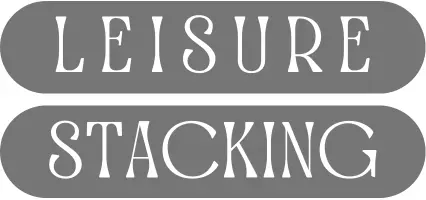Fitting leisure activities into a demanding schedule often comes with a side of guilt, doesn’t it? We’ve all been there.
Guess what? You can ditch that guilt. I’m here to share some research that’s cheering on your leisure time. And trust me, it’s a game-changer.
Stick around, because we’re about to unpack some serious science that’ll have you penciling in downtime with zero regrets. Let’s get to it!
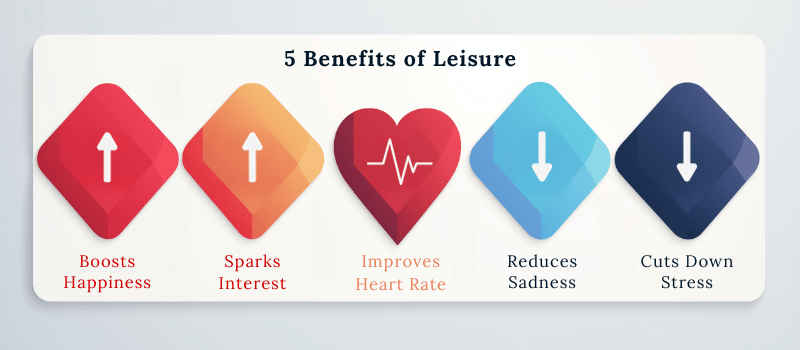
What Are 5 Research-Backed Benefits of Leisure?
Ready for some eye-opening facts about leisure? Leisure…
Boosts Happiness: It isn’t just fun; it’s a happiness booster! Engaging in leisure activities can genuinely make you happier.
Reduces Sadness: Feeling down? Leisure to the rescue! Engaging in leisure activities can help lower those blues.
Sparks Interest: Boredom, be gone! Leisure activities can reignite your interest and curiosity in life.
Cuts Down Stress: Say goodbye to stress. Leisure time can help you unwind and reduce those stress levels.
Improves Heart Rate: It’s not just about your mood; leisure can also decrease your resting heart rate.
And here’s a bonus fact: when you mix leisure with some exercise, the benefits amplify. More happiness, less stress, and a healthier heart – it’s all part of the leisure package!
Now, let’s dive into the nitty-gritty. We’re about to unpack the study “Real-Time Associations Between Engaging in Leisure and Daily Health and Well-Being“. Get ready for a chart-packed analysis that brings these benefits to life.
Leisure Boosts Happiness
Engaging in leisure comes with a quantifiable boost to your happiness. The study shows that people are 8.9% happier when they are engaging in leisure rather than skipping it.
But let’s not sideline exercise — it’s a heavyweight in the happiness arena too. The same study indicates a substantial 11.6% leap in happiness when people get moving with some exercise compared to when they lounge out of it.
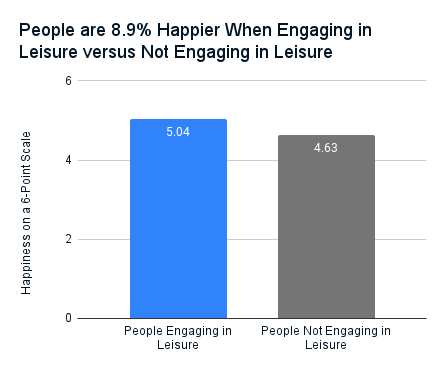
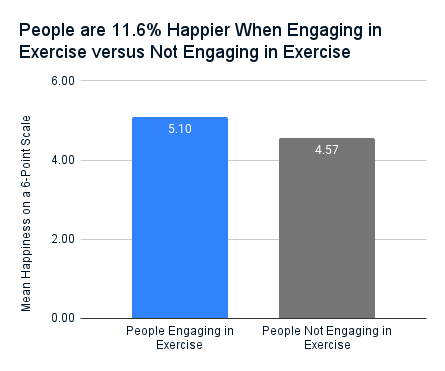
This isn’t just guesswork; the data comes from a community sample of 115 people who reported their experiences six times daily over three days. Each time they reported in, they marked whether they were engaging in leisure and/or exercise. They also detailed their current mood, level of interest, and stress levels. The study didn’t just rely on these subjective reports; it dove deeper, with participants using heart rate monitors and providing saliva samples for cortisol analysis.
Leisure Reduces Sadness
Diving into leisure can seriously cut down on the blues. The numbers say it all: individuals feel 18.5% less sad when they’re soaking up leisure activities. And exercise? It’s a game-changer, slicing sadness by a whopping 29.8%.
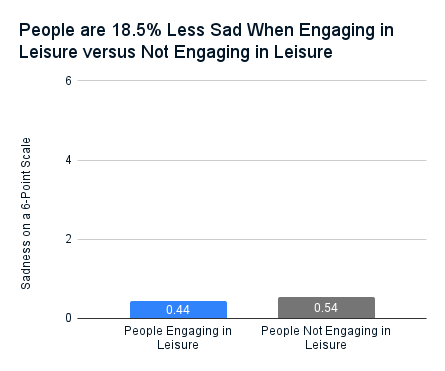
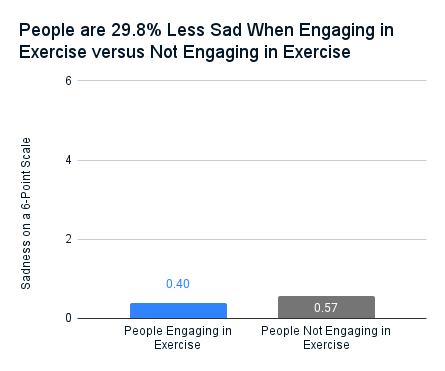
This is no fluffy claim — it’s backed by real-deal numbers. Participants in the study, all 115 of them, recorded their mood swings on a zero to six scale — zero being not at all sad, six being super sad. Each check-in, they’d report if they were kicking back in leisure or getting their sweat on with exercise. The conclusion? Both leisure and exercise are knockout moves against sadness.
Leisure Sparks Interest
Here’s a fascinating twist: leisure isn’t just about chilling out, it’s also about piquing your interest. Engage in leisure, and watch your interest levels jump by 5.7%. And when it comes to exercise, it’s an even bigger deal — a 17.3% surge in interest!
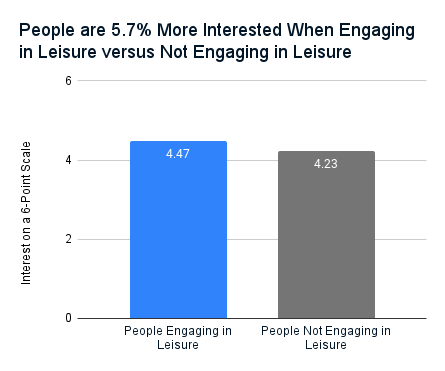
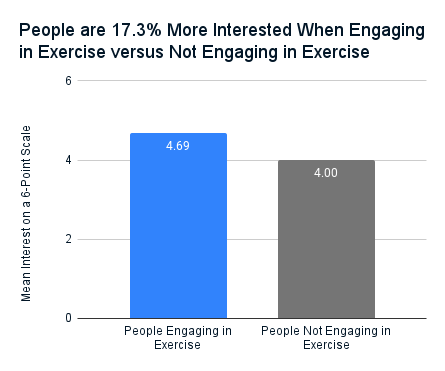
But wait, there’s more. This isn’t just about feeling more engaged. The stakes are higher. Previous research has linked boredom to not-so-great health choices. Think increased drug use, overeating, and, yes, even riskier behaviors like smoking and excessive drinking. It turns out, the more bored a person is, the more likely they are to engage in these unhealthy habits.
So, next time you’re contemplating leisure or exercise, remember — it’s not just about fun or fitness. It’s about keeping boredom at bay and steering clear of those health pitfalls.
Leisure Cuts Down Stress
Now, let’s talk about stress.
The news is good: leisure slashes stress levels by a whopping 33.9%! And if you add exercise into the mix, the stress reduction is still impressive at 23.1%. These numbers come straight from people’s real-time reports on a 6-point scale.
Indeed, leisure moves the needle away from”extremely stressed” and closer to “not stressed at all,” and can thus significantly dial down the pressure.
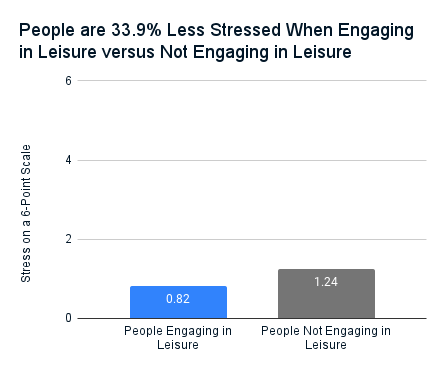
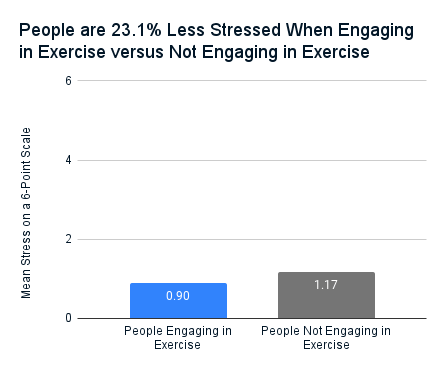
But wait, there’s a twist.
When stress was measured with a more nuanced 4-item scale, the picture was a bit different. Participants were asked, “At the time of the prompt, did you feel difficulties piling up so you cannot overcome them?” Their responses, on a scale from 0 (not at all) to 4 (very much), revealed a less pronounced link between leisure and stress levels. This suggests that while leisure can help, it might not be a silver bullet for every stressful scenario.
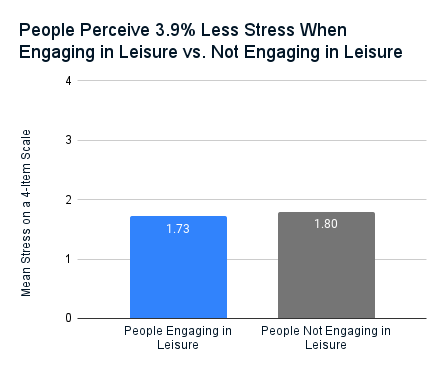
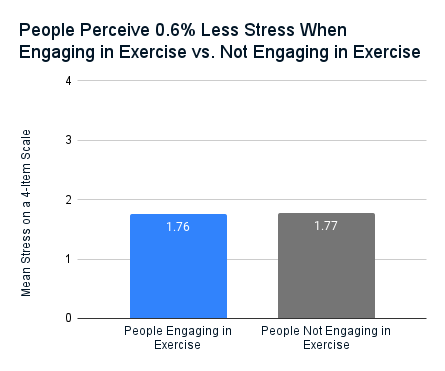
And then there’s cortisol, our stress hormone. Leisure showed a modest 4.1% decrease in cortisol levels, which the researchers interpreted with caution, noting that “leisure was unrelated to salivary cortisol.” In contrast, exercise packed a punch with a 22.2% reduction in cortisol levels. This disparity suggests that while leisure has its perks, exercise is the heavyweight champion in managing cortisol.
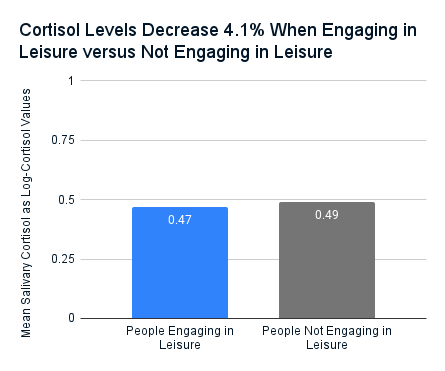
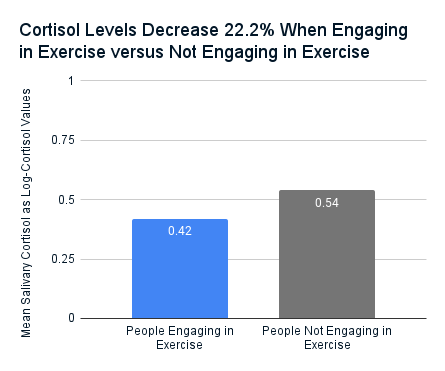
Leisure Improves Heart Rate
Heart rate, a vital indicator of overall cardiovascular health, is significantly influenced by our activities. Interestingly, when it comes to leisure, the effect is a calming one. The study discovered a 2.4% decrease in heart rate while engaging in leisure activities, highlighting its role in cardiovascular relaxation.
However, flip the script to exercise, and there’s an 8.3% increase in heart rate. It’s a necessary spike, though, as exercise strengthens the heart muscle.
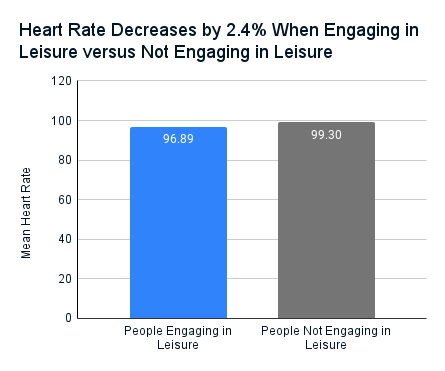
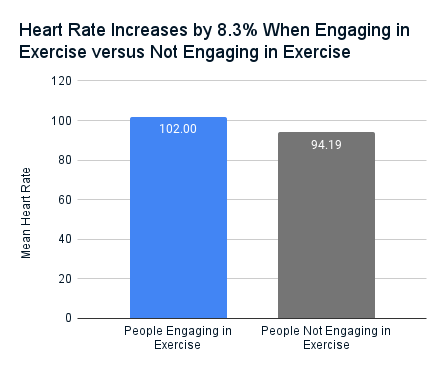
The Study Behind the Data
The report that has fueled our insights is titled “Real-Time Associations Between Engaging in Leisure and Daily Health and Well-Being.” This in-depth study was meticulously crafted by a trio of experts: Dr. Matthew J. Zawadzki, Ph.D., from the Department of Psychological Sciences at the University of California; Dr. Joshua M. Smyth, Ph.D.; and Heather J. Costigan, B.S., both from the Department of Biobehavioral Health at The Pennsylvania State University.
Their collaborative effort brought to light the nuanced effects of leisure and exercise on our daily health and well-being. Each author brought their unique expertise and perspective, culminating in a study that’s as comprehensive as it is enlightening. Their respective academic homes, the University of California and The Pennsylvania State University, are known for their cutting-edge research, making this study a noteworthy contribution to our understanding of leisure’s impact on health.

From Academia to Media: The Study's Broad Reach
The impact of this study extends far beyond academic circles. With 98 citations in Google Scholar, it’s clear that the research resonates across various fields, influencing thinkers and practitioners alike. But that’s just the tip of the iceberg.
The report has made waves in the media, with over 100 mentions in high-profile outlets. Its insights have sparked discussions in prestigious publications like Harvard Business Review, Lifehacker, and Entrepreneur. Here’s a glimpse at some of the most intriguing articles that have drawn from this groundbreaking research:
- Can Hobbies Actually Make You a Better Person? – Featured in Harvard Business Review, this article explores the transformative power of hobbies on personal development.
- Why Personal Goals and Hobbies Are Essential for a Fulfilling Career – Entrepreneur dives into how leisure activities can enrich your professional life.
- How to Get Back Into Your Favorite Childhood Hobby – Lifehacker takes a nostalgic turn, encouraging readers to rediscover the joys of their past hobbies.
These articles underscore the far-reaching influence of the study, showing how its findings resonate in various aspects of life, from personal growth to career development.
Experience the Benefits of Leisure with a New Hobby
Want to unlock those leisure benefits we’ve been raving about? Easy! Our guide to hobbies and leisure is your golden ticket.
Think of it as your leisure playground, brimming with over 300 hobbies across five core categories. It’s your chance to dive into a world where hobbies meet happiness, where stress takes a backseat, and your heart rate gets just the right kind of workout. Ready to find your leisure match? Jump in and let the fun begin!

Ditch the Guilt, Embrace the Benefits of Leisure
It’s clear: leisure isn’t just a luxury; it’s a necessity for a healthier, happier life.
This isn’t just talk – the data backs it up. The study says, “participants had more positive and less negative mood, more interest, less stress, and lower heart rate when engaging in leisure than when not.” And if you pair leisure with exercise? You’re turbo-charging these benefits, albeit with a bit of a heart rate hike.
Now, it’s over to you. How will you integrate leisure and exercise into your daily life to harness these incredible benefits? What’s one leisure activity you’re excited to try or revisit? Share your thoughts and plans in the comments below.
Leisure Planning?
Master the art of planning your leisure activities. Check out “Leisure Planning: A Guide to Optimizing Your Free Time.”
